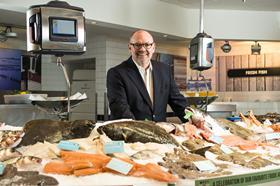
Tell me about Bidfresh. What’s the structure of the company and what product lines do you principally source?
Stephen Oswald: Bidfresh is a subsidiary of South African foodservice giant Bid Corp. Bid Corp realised that supplying fresh produce required a different management approach to broad line foodservice ranges. They correctly believed that a fresh business needed to be autonomous, flexible, nimble and creative to compete in such a competitive market. Bid Corp acquired Seafood Holdings in December 2010, and gave it the necessary autonomy to continue to operate successfully. Seafood Holdings grew at 20 per cent per annum, which encouraged Bid Corp to support the management team in their quest to expand the range from fish into produce, dairy and meat. Since then the business has grown from £80m (fish) turnover to £280m (£160 fish, £50m meat and £70m produce and dairy).
How important is innovation to Bidfresh and what have you been doing in that area?
SO: Bidfresh sees innovation through a number of lenses:
• Food sourcing innovation: We constantly seek to shorten our supply chain, building links with our hunters, gatherers, growers and farmers. This innovation builds a stronger supply chain, improved traceability, greater consistency and better quality.
• Product innovation: We seek out new and exciting products that may be special or act as substitutes for less environmentally attractive products.
• Sustainability innovation: We seek to source as much of our product from suppliers that are accredited by an accepted international body where that accreditation encompasses sustainability issues.
• Process innovation: The cost of the ‘back office’ is a constant thorn. We seek to reduce the burden of this for us and our customers. A recent example is the implementation of hand-held delivery confirmations. However, we believe that customers must be able to build relationships with the people in our business and as a result we make contact with our customers a priority at all times.
What trends are you seeing in terms of what food consumers and your customers are looking for at present?
SO: Consumers are demanding more fresh product than ever before. This presents our customers (restaurants and caterers) with wastage issues that they would not be presented with using a frozen alternative. Combine this requirement with smaller kitchen space and a general de-skilling of staff and our customers are struggling to meet their customers’ demands. To overcome this, we are pre-preparing more product, supplying more regularly, and managing lower drop values.
Do you feel the current growth in the eating-out sector will be maintained?
SO: Eating out has become part of the leisure industry. People eat out not just for sustenance but also for entertainment. I don’t see this changing in the long run.
How important is British sourcing right now in your sector, and has the Brexit issue given added impetus to home-produced food?
SO: British sourcing has been a critical requirement of the industry for several years. Brexit may play its part in the future but with the current open borders the price of food quickly equalises across Europe. This has meant that with the lower value of the pound we are seeing local prices driven up as European buyers move into local markets to take advantage. This drives up the local price.
Aside from that, what impact has the Brexit situation had on your business and how are you managing that?
SO: At this early stage the Brexit impact has been the decline in the value of the pound. This has forced our cost base to rise. Passing on this increase is always difficult and we have had to absorb some of the pressure. However, it would appear that the pound is going to remain low for some time, which will force further price increases. In the longer term, it is important that we can enter into contracts across Europe. These contracts are often for 12 months. We will need to have some certainty when the break does happen that we can still contract with suppliers in Europe.
Does being part of a big group make it easier to deal with the price pressure being faced across the food industry at present?
SO: Economies of scale do not necessarily work in the fresh sector. We look to buy from smaller suppliers that are close to product. These suppliers are very price-sensitive and will react quickly to market conditions. The ‘big company’ backing gives our supplier base more confidence that they will be paid on time. We therefore find that in times of shortages or volatility we will have continued supply while others may struggle.
What’s your advice to food producers who may be currently supplying the supermarket sector but might be considering switching to foodservice supply?
SO: The foodservice sector is driven by chefs who are, in the main, skilled and knowledgeable. An entrant into the market must have the right product. To some extent, with the right product, it will speak for itself.



